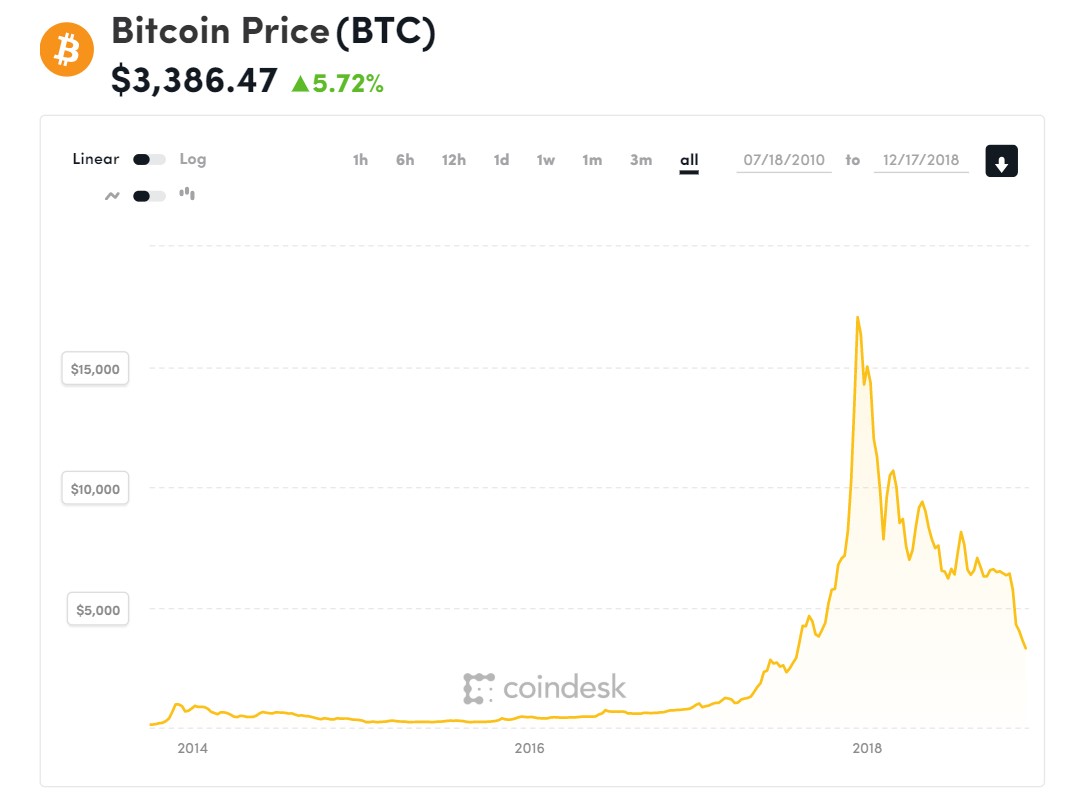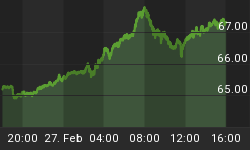Monday, December 17, 2018
Markets down slightly ahead of busy week. U.S. stocks were down at the opening on Monday. The dollar slipped ahead of a Fed meeting, while a government shutdown looms at the end of the week. U.S. consumers are now the most pessimistic about the trajectory of the economy since 2013, according to a new poll. U.S. homebuilder sentiment is also at its worst point in three years. Poor economic data from China also weighed.

(Click to enlarge)
- Bitcoin is down to roughly $3,300 as of mid-December, down from nearly $20,000 just a year ago. It could “prove one of the most dramatic economic bubbles in world history,” according to a feature article in Bloomberg Businessweek.
- The article notes that Bitcoin and other cryptocurrencies began with lofty goals of fighting greed, financial manipulation, Wall Street power, while also helping develop an alternative payments system that would be more democratic, secure and seamless.
- Now, Bitcoin has “become many things to many people,” Bloomberg Businessweek concludes, with much of the early optimism dashed.
Markets
European car sales slump. Auto sales in Europe have been slumping since September, three straight months of declines. If car sales slip again in December, the industry could see negative growth for the year. The UK and Italy have been the main sources of depressed demand, although Germany, the largest auto market in the European Union, saw sales fall by 9.9 percent in November from a year earlier. Shares of major European automakers are down on the news.
U.S. high-yield credit markets grinding to a halt. U.S. credit markets are running into trouble as fund managers and investors steer clear of high-yield debt amid rising interest rates. There has not been a single company that has issued high-yield corporate debt so far this month, according to the FT. If December ends without an issuance, it would be the first month with no high-yield bond issuance since November 2008, during the depths of the financial crisis. The lack of interest in risky debt is likely the result of financial volatility, rising interest rates and economic uncertainty. Related: Saudi Aramco Hit With New Variant Of Old Cyberattack
Weak economic data from China. Global markets sunk on Friday after China published some weak retail and industrial figures. The data adds to the growing pile of evidence pointing to a rather significant economic slowdown in China. Foreign investment declined in November, the housing market is showing signs of strain and auto sales have plunged. The government is stepping up stimulus spending to cushion the blow, but that comes at the cost of rising debt.
Commodities
Commodities fall to 18-month low. Commodifies have had a rough ride this year and could close out the year on a down note. The Bloomberg Commodity Index declined on Monday to its lowest point in 18 months. Crude oil has certainly weighed down the index as of late, but the trade war has savaged commodities since mid-year.
Gold speculators bullish. While commodities are down, speculators are starting to become a bit more positive on gold. Investors’ gold positioning flipped to net-long last week for the first time in five months, potentially a sign that sentiment is starting to rebound. In silver, investors are still in net-short territory, but are the least bearish since July, according to Saxo Bank.
Fed outlook key for commodities. The U.S. Federal Reserve is expected to announce another rate hike this week, but investors will be watching for clues into the central bank’s 2019 plans. “The Fed meeting will be the focus this week. A rate hike is seen as a done deal,” Commerzbank said in a note. “The signals the Fed gives for the coming year will be more important, however. The Fed Fund Futures now imply at most one further rate hike in 2019. Any indication that more rate hikes will be forthcoming could put pressure on gold.”
Energy
Investors skeptical of OPEC+ cuts. Hedge funds and money managers cut their net length in oil futures for another week, demonstrating a lack of faith in the OPEC+ production cuts. The reduction in bullish bets was the 11th consecutive week of short-selling in Brent. Saudi Arabia’s reported plans to slash crude shipments to the U.S. could help lower inventory levels where data visibility is highest. “We should be at just about the end of the cycle where longs have gotten wiped out,” John Kilduff, a partner at New York hedge fund Again Capital LLC told Bloomberg. “In the medium term, the Saudis exporting less to the U.S. should help us head higher.”
Paris Climate Agreement still alive, despite backsliding. The UN climate talks in Poland kept the Paris Climate Agreement alive, with nearly 200 countries agreeing to a series of technical implementation details regarding the 2015 landmark accord. The U.S., along with other oil producers such as Saudi Arabia, worked to water down the language in Poland. “Some delegations we are seeing backsliding,” Xie Zhenhua, China’s lead envoy, said last week.
Related: Huawei Plummets As CFO Faces Extradition To The U.S.
Oil prices fail to rise following OPEC+ agreement. Oil prices fell by 2 percent last week, which suggests that oil traders are not confident that the OPEC+ deal will eliminate the supply surplus. “The dust has settled on the decision by OPEC/non-OPEC to slash production,” said Stephen Brennock, an analyst at London brokerage PVM Oil. “Yet the producer alliance has so far little to show for it.” Oil prices ended last week back at pre-OPEC meeting levels.
Cryptocurrencies
Brazil state-owned bank to issue cryptocurrency token. The state-owned Brazilian National Social Development Bank (BNDES) will launch a pilot project in 2019, its own cryptocurrency intended to maintain parity with the national currency. The token will run on the Ethereum blockchain, backed 1-for-1 by the Brazilian real, according to CoinDesk.
Lessons from 2018, outlook for 2019. Gary Gensler, former chairman of the Commodity Futures Trading Commissions (CFTC) during the Obama administration, wrote a “lessons learned” piece for cryptocurrencies in CoinDesk. He laid out an optimistic case for digital tokens, which could lower the cost of verification, settlements, networking, etc., but face formidable challenges. He argues that cryptocurrencies need to reconcile with existing regulatory and governance structures, to ensure safety and integrity.
Bitcoin prices fall to new low. Bitcoin prices fell to $3,200 on December 14, a fresh one-year low. Plunging prices now have venture capital firms starting to withdraw from the sector. “We’ve seen half a dozen fundraising deals fall apart over the past month after the lead pulled out. All is not well in crypto VC investor land Good time to remind founders that a signed term sheet does not equal cash in the bank,” Barry Silbert, the founder and CEO of large-scale cryptocurrency-focused venture capital firm Digital Currency Group (DCG) said on Twitter.
By Josh Owens for Safehaven.com
More Top Reads From Safehaven.com
















